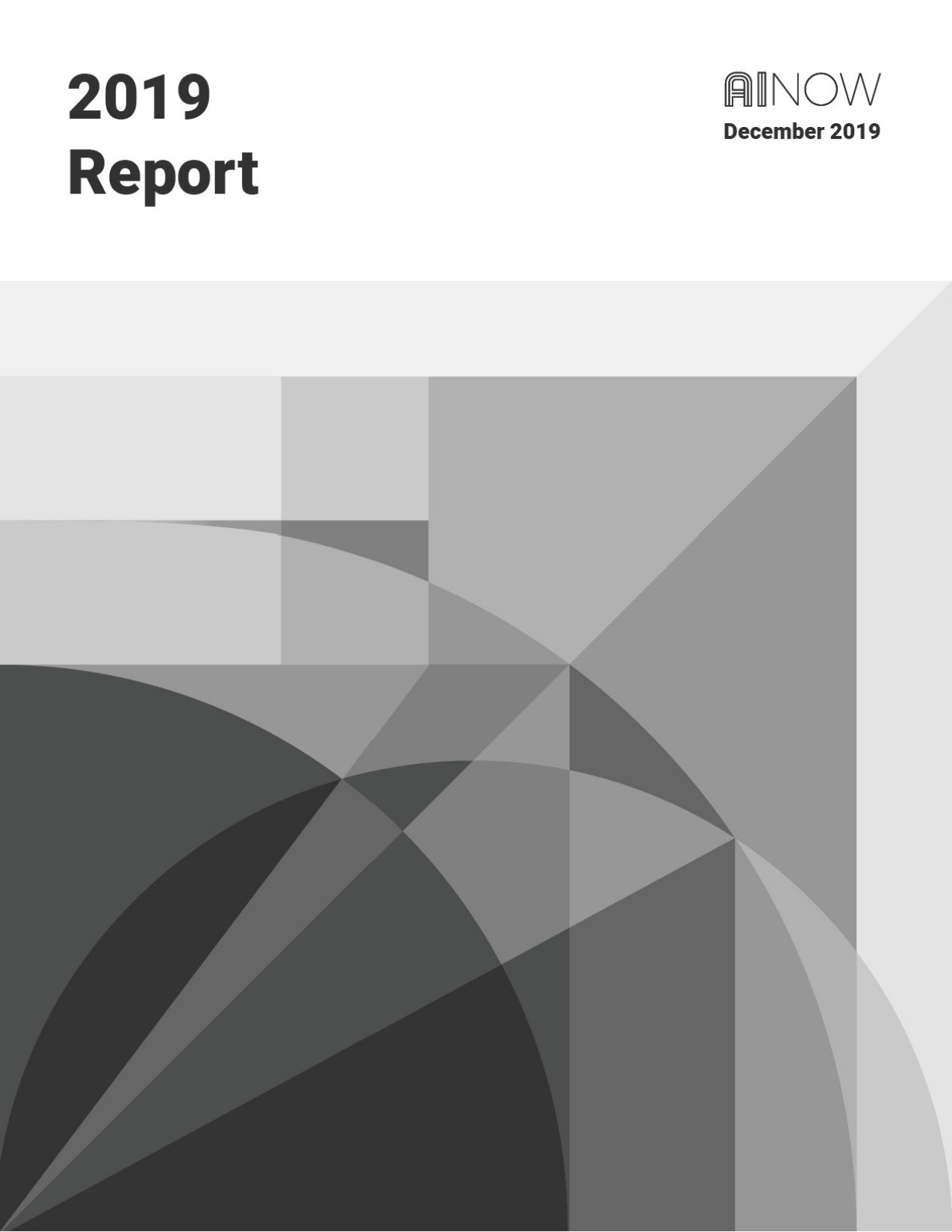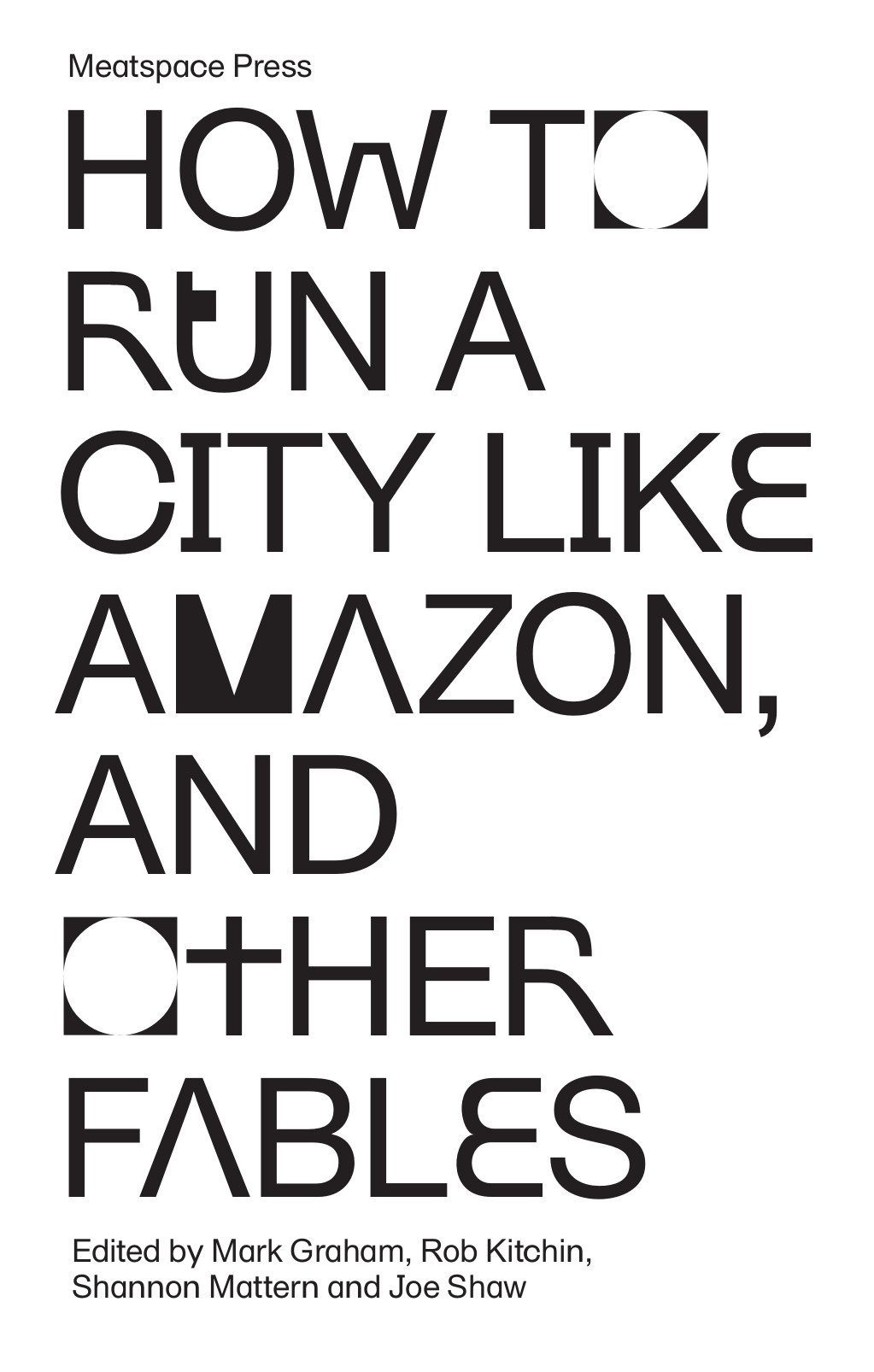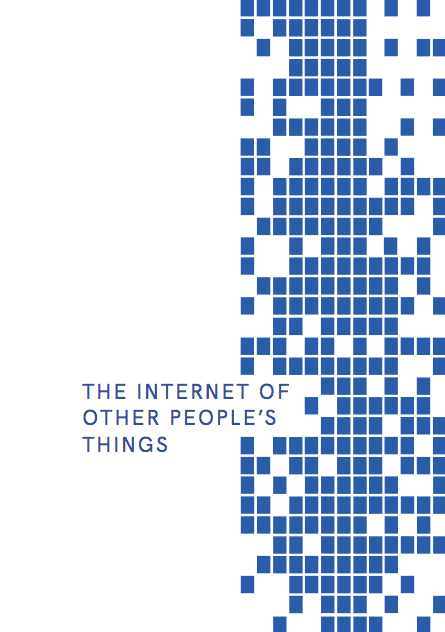AI Now 2019 Report (2019)
Filed under report | Tags: · artificial intelligence, automation, data, employment, ethics, gender, governance, infrastructure, machine learning, policy, power, race, society

This report “examines new research on the risks and harms of AI, including its use by companies to aggressively manage and control workers, its climate impact, and the growing use of facial and affect recognition. We also look at the growing movements that are demanding a halt to risky and dangerous AI, and offer recommendations on what policymakers, advocates, and researchers can do to address these harms.”
By Kate Crawford, Roel Dobbe, Theodora Dryer, Genevieve Fried, Ben Green, Elizabeth Kaziunas, Amba Kak, Varoon Mathur, Erin McElroy, Andrea Nill Sánchez, Deborah Raji, Joy Lisi Rankin, Rashida Richardson, Jason Schultz, Sarah Myers West, and Meredith Whittaker
Publisher AI Now Institute, New York, 12 Dec 2019
Creative Commons BY-ND 4.0 International License
100 pages
How to Run a City Like Amazon, and Other Fables (2019)
Filed under book | Tags: · city, entrepreneurship, governance, management, platform, technology, urbanism

“Should cities be run like businesses? Should city services and infrastructure be run by businesses?
For some urban commentators, policy-makers, politicians and corporate lobby groups, the answer is ‘yes’ to both questions. Others are critical of such views, cautious about shifting the culture of city administration from management to entrepreneurship, and transforming public assets and services run for the common good into markets run for profit.
The stories and essays in this book explore how a city might look, feel and function if the business models, practices and technologies of 38 different companies were applied to the running of cities. They ask: what would it be like to live in a city administered using the business model of Amazon (or Apple, IKEA, Pornhub, Spotify, Tinder, Uber, etc.) or a city where critical public services are delivered by these companies?
Collectively, the chapters ask us to imagine and reflect on what kind of cities we want to live in and how they should be managed and governed.”
Contributors: Manuel B. Aalbers, Tooran Alizadeh, James Ash, Sarah Barns, Gavin Brown, Ryan Burns, Matthew Claudel, Jeremy W. Crampton, Ayona Datta, Martin Dodge, Leighton Evans, Jessica Foley, Jennifer Gabrys, Mark Graham, Tony H. Grubesic, Edward Helderop, Kara C. Hoover, Andrew Iliadis, Kurt Iveson, Glenn Kaufmann, Rob Kitchin, Agnieszka Leszczynski, Sophia Maalsen, Shannon Mattern, Harvey J. Miller, Cian O’Callaghan, Nancy Odendaal, Dietmar Offenhuber, Alison Powell, Lizzie Richardson, Gillian Rose, Jathan Sadowski, Kalpana Shankar, Joe Shaw, Harrison Smith, Monica Stephens, Linnet Taylor, Jim Thatcher, Pip Thornton, Anthony Vanky, Alberto Vanolo, Alan Wiig, Katharine Willis, Matthew Zook.
Edited by Mark Graham, Rob Kitchin, Shannon Mattern, and Joe Shaw
Publisher Meatspace Press, London, Oct 2019
Creative Commons BY-NC-SA License
ISBN 9780995577671
1357 paragraphs
Review: Jeremy Williams (Int’l J Urban & Regional Research, 2020).
Comment (0)Linda Kronman, Andreas Zingerle (eds.): The Internet of Other People’s Things (2018)
Filed under book | Tags: · city, data, governance, infrastructure, internet of things, urbanism

“The Internet of Things (IoT), smart city initiatives, and smart home technology are marketed to us as sleek and glamorous 3D renderings promising a convenient and sustainable technology that will save us and our planet from a future of environmental distress. Yet the buzzword bingo of smart city rhetoric, the polished advertisements for networked devices, and the glossy packaging of smart home devices are in stark contrast to the news and research which investigates the vulnerabilities of our connected lives. The expansion of the IoT and the proliferation of virtually-connected data points are providing ever increasing amounts of information for those keen on use or abuse. The massive implementation of IoT in hyper-connected urban environments, paths the way to technocratic governance and urban development, corporatizing our living spaces into lock-in, hack-able, “pan optic” smart cities. The IoT seems to develop towards an Internet of Other People’s Things (IoOPT), where users do not own their data, agree to Terms of services that mean their data are then shared by default to third parties, and the risks that citizens rights are managed by technocratic governance or cyber criminals attacking critical infrastructures are always present.
In this cyberwar of ideas, an asymmetric battle for power and influence, systems will have to be more robust and people will have to be more vigilant. Therefore we turned to the community of artists, designers, activists, hackers and researchers with an open call for new critical perspectives on ubiquitous technology and its impact on our lifestyle. We were looking for projects that abuse to expose; artistic research and tacit knowledge that is produced through cultures of making, hacking, and reverse engineering. Our aim was to collect artworks, projects, essays, and interviews discussing questions such as: What does privacy look like in a smart home of connected objects? How are citizens involved in co-design collaborations with private corporations and the public sector to build better cities? How can we enable a secure and trustworthy Internet communication so that business, personal, and machine-to-machine interactions can be conducted safely and without interference?”
Publisher servus.at, Linz, 2018
Creative Commons BY-SA 4.0 International License
ISBN 9783950420012
235 pages

